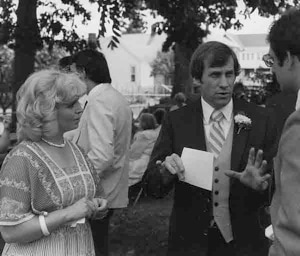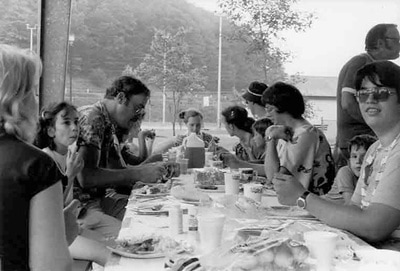A sort-of cultBackground: I’m a charismatic at heart. After all, I was “born again” during the Jesus Movement in 1971. When I relocated to Williamsport in 1979 as cameraman for WBRE-TV’s Central PA News Bureau, I joined the Door Fellowship since that was where many “Jesus Freaks” attended.
Two years later The Door, under Pastor Wayne Holcomb’s guidance, started promoting the scortched-earth policy of “disfellowshipping.” Anyone who disagreed with the church, anyone whom the church deemed a threat to their operation, was told to leave and not come back unless they repented of their ways. In a last-minute attempt to be a spokesman for many who had already left, I wrote the following letter to Pastor Wayne. Here’s what I said: Story: Introduction When Paul was teaching on marriage in the seventh chapter of 1st Corinthians, he had the wisdom to distinguish between his own opinion and direct commands from the Lord. So should it be with any follower of Christ. Whatever we say or write should be tempered by the concurrent revelation of the source of our information. Is it a direct command from the Father Himself as recorded in the Bible? Or is it only our personal perception of things based on our current understanding of, and relationship with, the Lord? Most of what comes out of the mouths of christians is just that–their own opinion. If we could keep that in mind we wouldn’t take each other as seriously as we do and we would avoid many fruitless arguments, bruised egos and severed relationships. We Christians like to impress others with the weight of our words. We want our listeners to think that we have a connection with God that’s better than anyone else’s. Yet the undeniable fact is all of us rely on the same two sources of information. The first source is the Holy Spirit, who speaks to us in a still, small voice we rarely chose to listen to. The second source is the small mass of gray matter inside our skull that knows so little. Clearly, our words fade in importance and punch when we take ourselves into account. As men and women of an infinitely complex heavenly Father, we should swallow our pride and admit that we now see through a glass darkly. Anything we say is imperfect compared to the perfect words of our Lord as recorded in the bible. Let us lay down our pride, put away our guns and say along with Paul...“in my opinion.” Unity In my opinion, the central issue at the Door Fellowship is not submission or prophecy or Pentecostal traditions but rather, the Door’s definition of unity. They would probably define unity as everyone thinking and acting as one. In other words, everyone doing the same thing. If achieving that sort of unity is their goal, then their task is threefold. First, boil down the complexities of Christianity into simplified, neatly packaged doctrines. Second, present these doctrines in a manner that only allows that one particular point of view to be heard. And three, eliminate any dissenting views or differing opinions. The fact is God never intended unity among the brethren to mean similarity among the brethren. When Jesus prayed that the church would be one, he gave as an analogy of unity the relationship between Himself and the Father. It should be obvious to us that these two spiritual entities are similar in their purpose but not similar in their function and composition. Our own definition of unity should therefore mesh with this example. Christians are in unity when their purpose–to glorify the Lord–is similar. However, their function in the body can be different (for example, “are all apostles?”) and their composition (that is, their opinions, personalities, ways of thinking) can be different. Variety is obviously part of God’s plan. If you don’t believe it, just look at the world He created. Therefore, difference of opinion within the body of Christ should be welcomed rather than smothered. In fact, there are specific reasons for a variety to exist. In Genesis, we see a world that is dark, void and without form. Everything is the same. All is conformity. Yet God sees the need for diversity, for things to balance each other by their differences. In His unfathomable wisdom, God creates differences. Lightness and darkness. Land and water. Plants and air. Animals and humans. Clearly, life as God designed it is made up of opposing and differing forces. Without variety there can be no balance. The very notion of achieving balance implies that you have opposing forces on the same see-saw. If you eliminate one force because you don’t agree with it, or because it acts or thinks or talks differently, you immediately have an imbalance. Variety is what the real world is all about. Variety makes for complexities. Although some people would have us believe that life consists of black and white issues, problems and solutions, it is just not that way. Life consists of different shades of gray. So it is with Biblical principles. Only those principles stated by Jesus and recorded in His Holy Word can be said to be black and white issues. There is no room for compromise there. Everything else is gray, meaning that we have only rough guidelines. We can suggest certain interpretations and offer advice and insight, but we cannot dictate, mandate. legislate or insist on one and only one interpretation. Consequently, we must respect each person’s own personal relationship with God and trust that God will speak to them also. This is very difficult to do, especially if one is a leader in charger of a flock. The temptation is to set himself up as a mouthpiece of God. He is under the illusion that unity will be achieved when one and only one voice is heard. He may see himself as the leader of a spiritual army where no one questions the general. He may believe that the battle call will be indistinct and nobody will be ready if more than one bugle is heard. He may feel that if something worked for him, then that same thing will work for his entire flock. Whatever his reason, he sets himself up as the authority to be submitted to. When he does so, he violates his listener’s “personal spiritual space.” The listener will feel threatened. The listener instinctively knows when his territorial boundaries–that realm where he and the Lord have a very personal and unique relationship–have been violated. There are two possible reactions at this point. One, the listener will ignore his gut-level feelings, repressing them in the name of “rebellion,” “flesh,” insubordination,” “lack of proper respect to authority,” or whatever. If this repression continues long enough, the listener will eventually yield his mind over to the leader and let him dictate his thoughts and behavior. The other reaction is to escape from the control of “the voice.” This may consist of mentally turning off one’s attentiveness. More drastically, the person may feel compelled or obligated to leave. This is why we have hundreds of denominations today. Each denomination is a pathetic monument of sorts to some person who believed he was right and everyone else was wrong. Someone set themselves up as the voice of God and tried to impose his knowledge onto his followers. Some submitted and thus the denomination was sustained. Others resisted, broke away and formed a new denomination. There is a very real threat of this happening at the Door Fellowship. People feel as though their own “spiritual space” is being violated. They are being told to think and act in certain ways and to believe certain things. In essence, they are being told that their own intimate relationship with God–the gentle, still voice they’ve learned to listen to and obey–is no longer worth listening to. After all, there is only one way to think on any issue if you want to fellowship at the Door. Naturally, the people are feeling threatened. It’s an uneasiness mixed with confusion. For they often hear one thing and see another thing. They hear, for example, how important it is for a husband and wife who are in disagreement to sit down and talk things out. Yet as body members of an ailing church they are being told not to talk about the very problem confronting them! On the one hand we are told that we should love our brothers and sisters to the point of laying our lives down for their sake. On the other hand we’ve heard it said over and over again, “If you don’t agree, go somewhere else.” We are told that there is real freedom in the Spirit at the Door Fellowship. Yet we see a real fear among the people to act differently or to rock the status quo. We’ve also seen what happens to those who do think differently. We’ve heard it said laughingly that there is certainly no dictator in office. Yet we’ve seen those in positions of authority who disagree with the leadership being told to resign. We’ve been taught from Matthew 18 that the good shepherd leaves all 99 of his sheep to search for the one sheep that is lost. But we don’t see that principle put into practice at the Door. Instead we see the reigns pulled in tighter around the 99 sheep. Speakers are brought in from outside to suggest that we not even associate with the sheep who have strayed. We don’t see any evidence of the shepherd trusting the 99 sheep enough to leave them alone so he can search. Is there any uncertainty as to why confusion reigns? Or why the people who feel threatened are leaving? Communication The people who have questions, the people who feel threatened, the people who have been offended must be able to communicate with the church leadership. The freedom and the willingness to talk things out must be evident. Without communication there is darkness. Where darkness is, so is confusion. At the present time, those who speak out do so at a very high risk. We have been told that it is wrong to talk about certain issues. We have been admonished to rebuke people who did speak out. We have seen prophecies squelched and persons screamed at because they tried to communicate. We have seen concerned members who wanted to talk but actually feared the consequences. So they held back and said nothing. It is a repressive environment. There can be no walking in the Light when such conditions exist. Look at the example Jesus set. His disciples could ask him anything, without fear of disfellowship, being asked to resign or looked upon as unspiritual. In the same vein, Jesus communicated honestly and openly with his disciples. He was so frank he even told them he was going to be killed. Now that is what communication is all about–a free exchange of information, with the freedom to be yourself and to express your innermost thoughts and fears, without fear of punishment. When a part of our physical body does not or cannot communicate with our brain, we call that area paralyzed and say the body is sick. All efforts are directed towards restoring the lines of communication which, interestingly enough, consists not only of information flowing from the brain to the affected area but also from the affected area to the brain. You see, health cannot exist without communication in both directions. The lesson is obvious. The leadership at the Door Fellowship has to be willing to listen to the Body, just as the Body has to be willing to listen to the leadership. A healthy Body of Christ means that each member can be him/herself. When he is in pain he can speak out and be heard. A spirit of cooperation has to be present, too. Each side must be willing to listen with open ears and an open heart. To do otherwise is to be hypocritical. You put on the appearance of wanting to communicate but inside you have a heart of stone. Practical Applications Keeping these two concepts, unity and communication in mind, we now look at some specific problems at the Door Fellowship.
I had also attached a xeroxed article on unity with this preface: “This article, which was written by the editors of The Wittenburg Door, a christian magazine, led me to a better understanding of unity. Being a foundational truth, I feel we must come to grips with unity before we can discuss anything else.” More articles were attached with this appendix note: “I include these two articles from Christianity Today. I am not suggesting that The Door Fellowship is a cult. However, one can conclude from these articles that The Door has several qualities of a cult, especially in the area of authority in leadership.” One of the “famous” personalities to be kicked out was Dennis Cramer, now a well-known prophet in the Elijah list circles. HIs book “Charismatic Curses” (re-published as “Breaking Charismatic Curses”) details his bad experiences at the Door although he doesn’t mention them by name. He had been an elder at the Door. Ted Hayes, another Door elder whose loyal friends had stood up for him at his denunciation and paid the price by subsequently being dragged out, had been a key figure in organizing the first Jesus Music festival in 1973. Shortly after his formal “disfellowshipping,” he moved to CA where he became a prominent conservative community organizer in LA. An interview I did with Ted in 1984 is posted here. The Door is alive and well. Wayne and his wife are still involved, although their three sons Mark and Matt and Mike have assumed key positions in worship, youth and preaching. I was still around when they bought and remodeled the old Rialto Theater, the church’s current home. I’ll never forget standing knee-deep in asbestos fibers as a dozen of us volunteers tore apart the old furnace in the basement. All we had for protection were cheap rubber-banded paper masks that hardly covered our mouth and nose. Someone prayed for protection from the deadly carcinogen in Jesus’ name. Why did we do it? We were expected to help. It became a project for the home groups. I sold my high school class ring for its gold and gave the money to the church during one of their many high-pressure fund-raising campaigns. (“God’s telling me that five people are going to give $1000 tonight.”) I saved some notes I’d taken from a meeting I had with Wayne shortly before the hammer came down on me. “Wayne says he wasted his time talking to me.” “Wayne feels that what I’m doing is sin. Not learning the principle of commitment.” “The paper is an indirect way of trying to correct.” “The sin of division, contention and confusion.” “I’m not bringing unity, edification to the church. It is Satanic.” “I spend quite a lot of time with the girls. I haven’t shared the article with the brothers.” “Co-pastors” Margret and Wayne Holcomb of the Door Fellowship in Williamsport, PA. They actively promoted the flawed “disfellowship” policy. Elder Dave Bachman was “disfellowshipped” a year after this picture was taken. One day he scribbled a note and handed it to me. It read, “Harmony is the product of differences, not similarities.” In June 1982 about half of the ~50 “dissidents” attended a picnic at Northway Park. Some of these “shunned” folks never set foot inside a church again. Left to right: Steve Ream, Jim Hepler, Jim Hayner, Wes Young. Wes Young, on left side of table, had a son who later died of leukemia. Some at The Door said it was because they had left. Dennis Cramer (on right, with hat) and his wife Dianne (looking away from camera), Kathy Ergot (at end of table), Gail Mosteller (center right) and son Brian (tinted glasses). Dianne Cramer (left). Karen Derby (blond, center) did a sit-down protest on stage during a Sunday meeting!
0 Comments
Your comment will be posted after it is approved.
Leave a Reply. |
AuthorLynne Whelden Archives
June 2017
Categories |





 RSS Feed
RSS Feed
